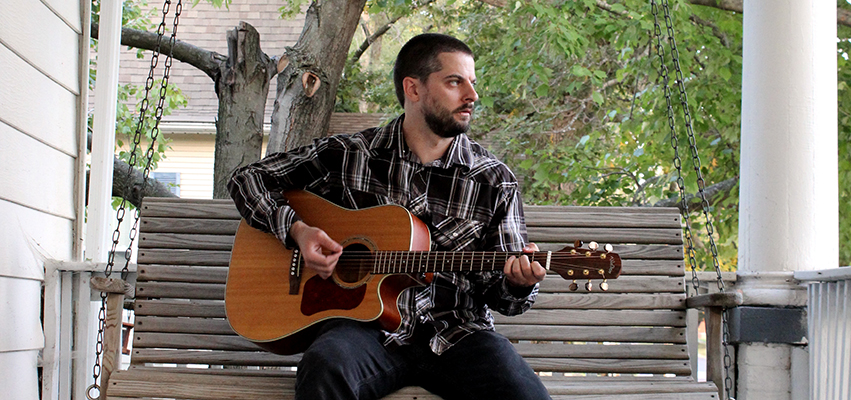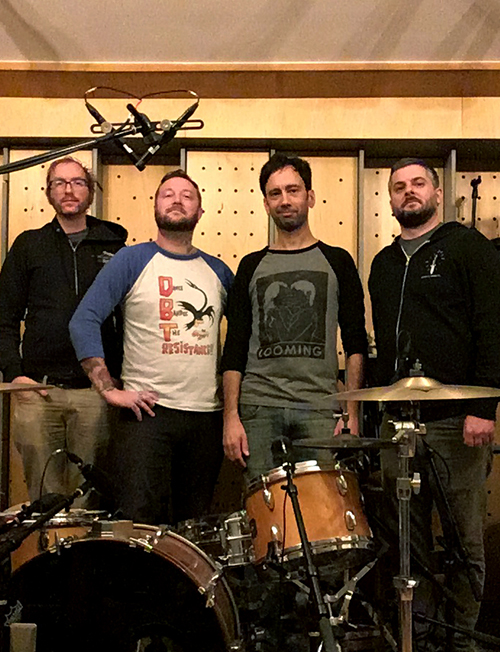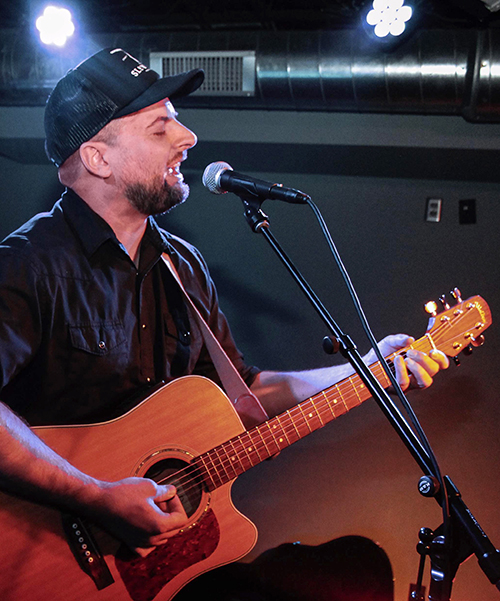
Born and raised in the Peoria area, Jared Grabb has been making music and booking shows for 25 years. He’s toured all over the country in various bands and even played in Europe, while evolving his sound to encompass country, blues, folk and bluegrass influences amongst his indie/punk roots. His current band, Jared Grabb Among Thieves, allows him to keep one foot in the world of rock ‘n’ roll while his solo work as a singer/songwriter reflects his earnest brand of indie/Americana. Grabb recently dove headfirst into local history with the launch of Middle America, a podcast that brings together storytelling and music to focus on Midwestern history and experiences.
Tell us about your background as a musician, and some of the highlights of your musical journey.

I started playing guitar in local rock bands as a teenager during the late 1990s. During my twenties, I began branching out to gigs around the country with the bands Scouts Honor, The Forecast and Cherry Lane. We came up through the underground all-ages rock circuit (sometimes referred to as the DIY circuit or the punk circuit), so we were playing a lot of houses, veterans halls, churches and clubs instead of bars.
We were able to experience some amazing adventures on the road, especially with Scouts Honor. With that band, I played in more than 40 states, as well as in Germany and Switzerland. We played South by Southwest in Austin, Texas, and also at the legendary CBGB’s in New York City before it was shut down.
When the bands needed a break from gigging, I would perform solo with an acoustic guitar. I was searching for a unique voice, and while digging through sounds, came across some classic country, delta blues and 1970s folk. This was music I had spurned as a teenager, but I fell in love with it through artists like Johnny Cash, Son House, Hank Williams, Nick Drake, Mississippi John Hurt and Joni Mitchell. Bruce Springsteen was prominent in the mix as well.
These traditional American sounds began to work their way into my songs, and my thirties have now been spent largely as a singer-songwriter under my own name. When I get my friends to back me up on bass (Chris Anderson), drums (Tom Satterfield), and lead guitar (Brett Conlin), we go by Jared Grabb Among Thieves.
How would you describe your sound? What are some of your key influences?
In my sweeter, more tender moments, I would call what I do modern folk. In my louder moments with the band, it’s hard to deny that we are playing anything but rock ’n’ roll. Some middle ground is found galloping along into “alt-country” territory, but I often feel that I’m the only one who hears the country in my songs.
As for influences, they’ve come from a lot of different places. I learned how to write songs in the emo and indie rock scene, so bands like Cursive, Pedro the Lion, Hot Water Music and Peoria’s own Planes Mistaken for Stars are forever embedded in my guitar playing.
And, as I said earlier, artists like Johnny Cash, Son House and Nick Drake eventually worked their way into what I was doing. There have been lots of others as well, including Woody Guthrie, who was a great influence on my choice of song topics, and even Jay-Z, who was the first rapper to really wake me up to what words could do. These artists led to other influences like John Moreland, Sturgill Simpson, Jose Gonzalez, Kendrick Lamar, The Thermals and Austin Lucas.
Tell us about your upcoming record and how it came to fruition.
In the spring of 2020, we will be releasing an album called Among Thieves. The title arose after jokes about Bad Company’s song “Bad Company” on the album Bad Company. The ridiculousness of this naming became a sort of challenge in the back of my head. Could I make a song with the same title as the album and the name of the band? Eventually, I couldn’t help myself and indeed wrote “Among Thieves” for the album Among Thieves to be performed by Jared Grabb Among Thieves.
All joking aside, the album is an 11-song dive into the history of the Peoria area. I have been writing and performing music for more than 20 years now, with eight albums and numerous EPs under my belt. Many of our most popular songs, along with many of my own favorites, were songs that were strongly tied to this place and the experience of living here.
My last solo album, Masters, was a deeply personal folk record. When it became clear that the follow-up would be a rock record with my pals, writing more personal stories just felt wrong. Looking back on how my favorite songs were so intensely connected with this city, I came up with the idea to tell historical stories in order to, in a way, tell all of our stories. There was far more research done in the making of this album, and there were several drafts to many of the songs. It was worth it, though. I’m very proud of what we have created.
What inspired you to start Middle America podcast? Have you always been interested in local history?

The podcast came out of having too many stories to tell on an album, or from stories being too complicated to do justice in three minutes’ time. I am a big fan of podcasts—especially serialized storytelling podcasts like Unobscured, Crimetown, Myths and Legends, and the country music history podcast Cocaine and Rhinestones. For several years, I had been seeking a way to get into podcasting, but I didn’t feel like I had a story to tell. In researching for the album, it became clear these were stories that should be told more often.
Embarrassing as it is, I was not a big local history buff before these projects. I was lucky enough to have some very intelligent friends who teased my appetite with abridged versions of local tales. Their stories were intriguing enough to get me digging.
I also must say that I resisted becoming too involved in the local history community while writing the album, as I wanted to get my own take on things without being corrupted by the views of others. Now that the album is written and I seem to have a feel for the podcast, I greatly enjoy the Facebook communities that share bits of local history on the daily. I would also love to take part in some of the local tours at Springdale and in the historic homes on the bluff. However, I am a married man and a father of two. It can be difficult to find time.
How do your music and storytelling come together on the podcast and inform one another?
For me, consuming history alone can be a dry endeavor. Middle America podcast uses a fictional memoir and music to amplify the emotional connection with the historical subject matter. The theme song for the first season is a quiet, acoustic reworking of one of Scouts Honor’s most popular songs, “Prison Bars.” The song was written in my early twenties and deals with dual feelings of resentment toward Peoria and thankfulness for what Peoria and its people helped me become.
The first episode of the podcast explores these feelings while discussing the introduction of the first Europeans into the region, along with the difficulties they experienced. Acoustic guitars, banjos, accordions and other roots instruments aid the listener in their retreat back through time, while modern sounds are utilized to provide tension. Within each episode, only excerpts of the songs appear, which allows me to recontextualize the lyrics into new meanings that assist the narrative.
Beyond my own music, I also feature an outside musical artist in every episode. Each has a connection to the area being discussed, and I feel this ongoing feature provides another sonic portrait of the region.
What are some of the more interesting local stories you’ve discovered along the way?
The Shelton Brothers gang was a fascinating bunch. I already covered Bernie Shelton and his demise in an episode of the podcast, but I would like to devote at least two more episodes to the gang’s leader, Carl Shelton, and their primary rival, Charles Birger.
Also, as all should know, Richard Pryor is a vibrant and colorful character. The horrible circumstances of his upbringing reflect the disturbing treatment of the working class and minorities that can be seen throughout the history of this city, while his success as an adult can only provide hope for every dreamer who sets foot here.
Finally, tell us about your efforts booking live music.
I have been booking live, original music in the Peoria area for as long as I have been playing music. Some acts that my friends and I have brought to town include Against Me!, Minus the Bear, Hey Mercedes, William Elliott Whitmore, Motion City Soundtrack, Denison Witmer and Owen.
I currently book acts for the Blowin’ Smoke Music Series at Slow Hand Craft BBQ in Peoria Heights. We have a few shows happening through February for our winter series, and then we will pick up with our summer series in May. Slow Hand is a small place, so we shoot for more intimate performances—usually by singer-songwriters or songwriting duos.
This winter features largely regional acts. However, last summer we featured incredible performances by Matt Woods of Tennessee and Adam Lee of Kentucky. I am working to get more great touring talent for the summer of 2020. PM
Find Jared Grabb’s music on Spotify and other streaming services, and at jaredgrabb.com. The Middle America podcast can be found on Apple Podcasts or at midamericapod.bandcamp.com.
- Log in to post comments

